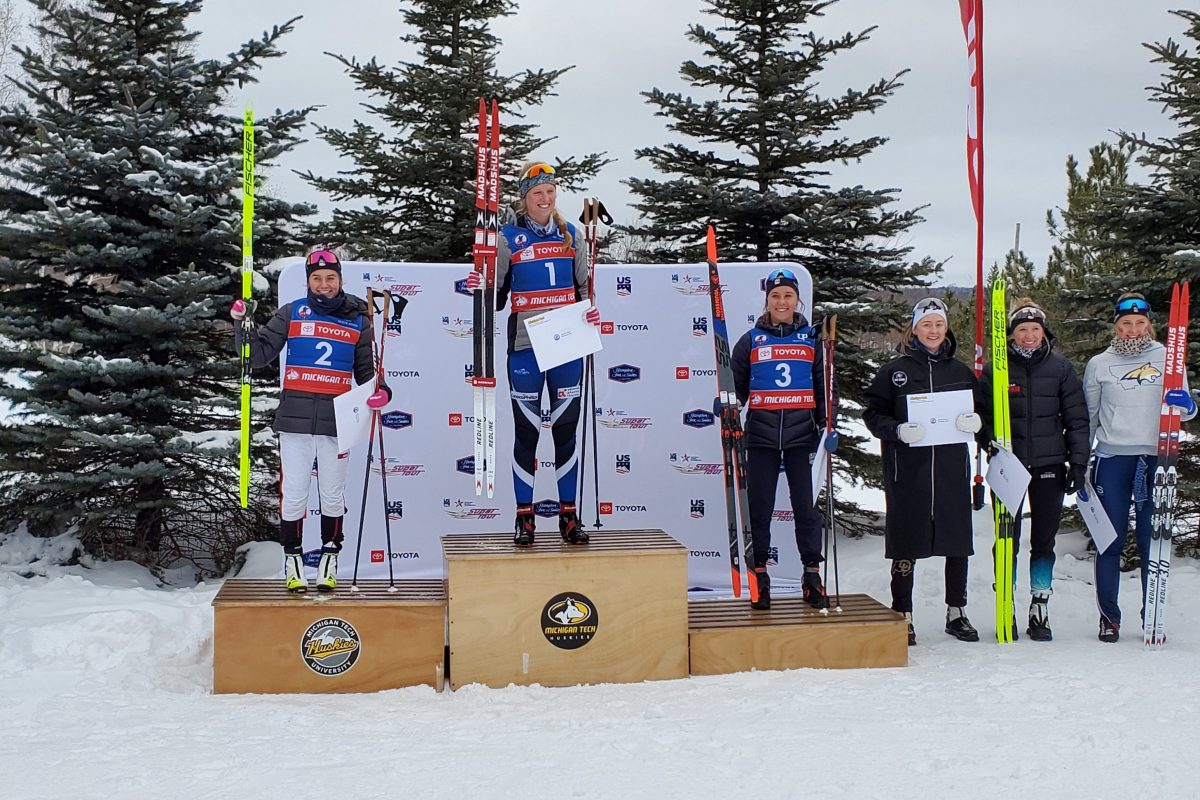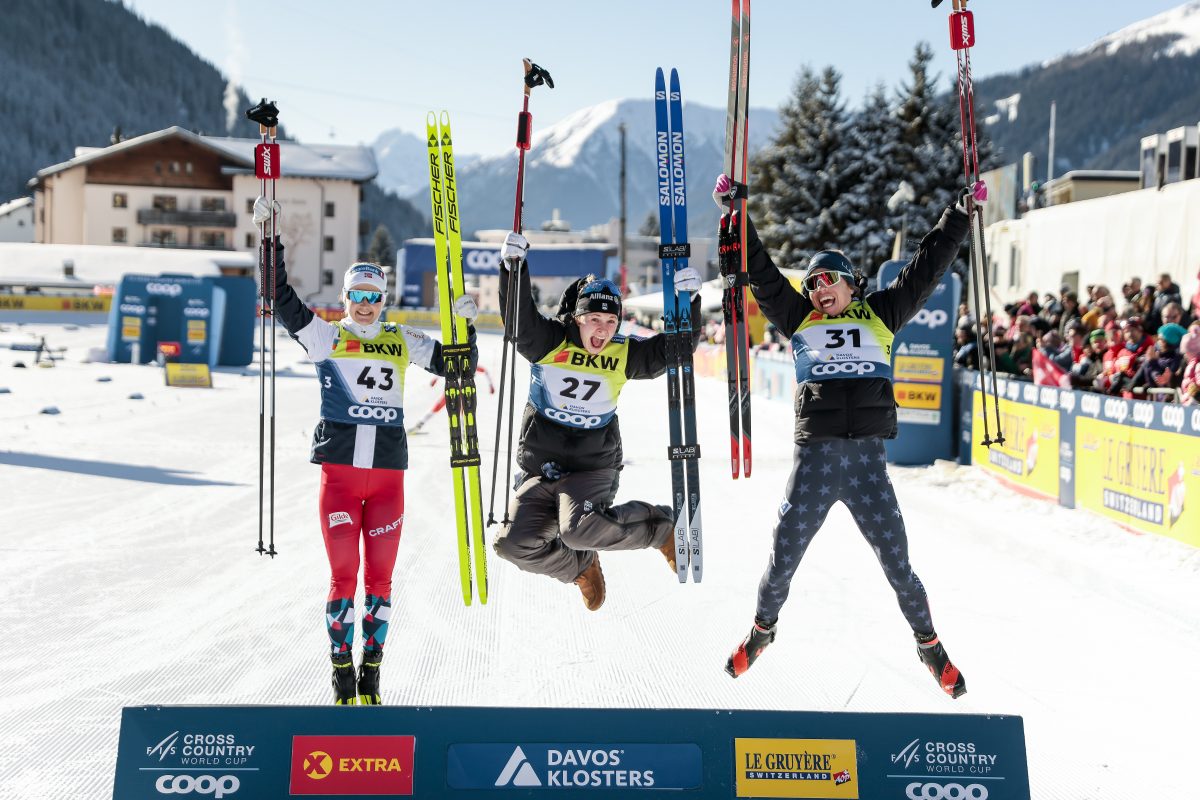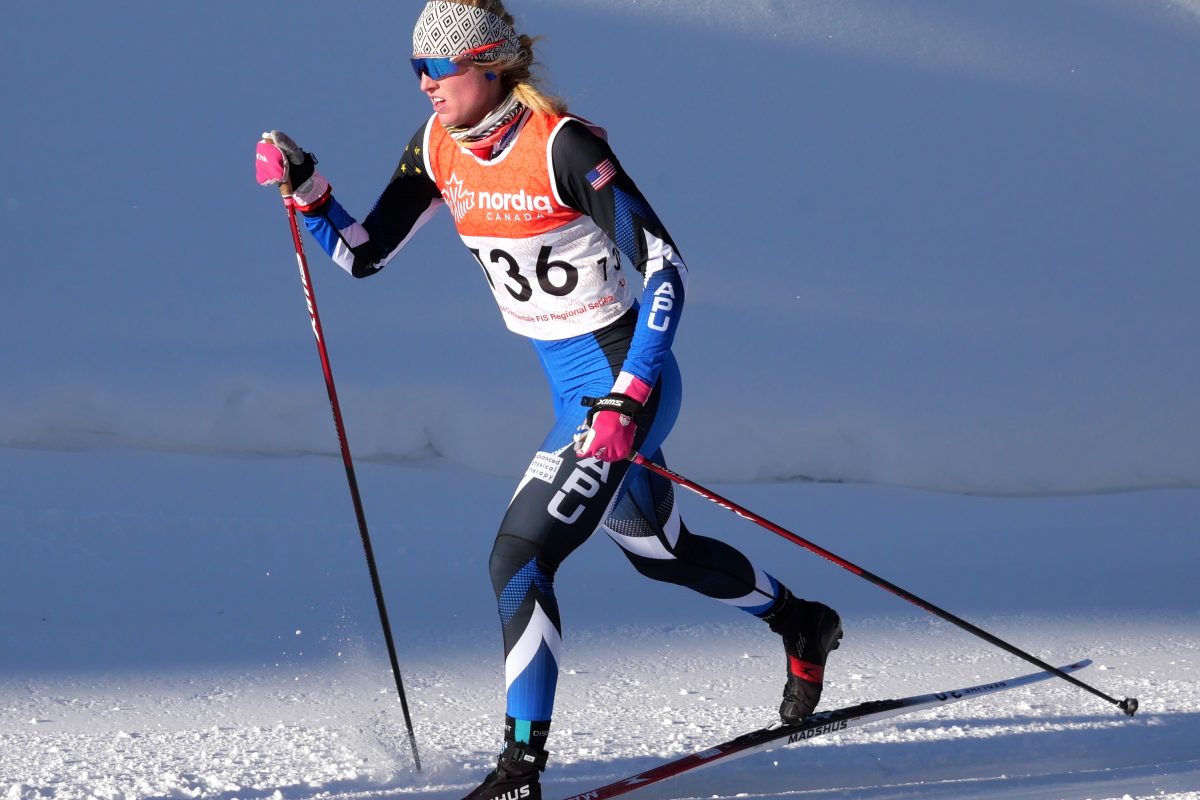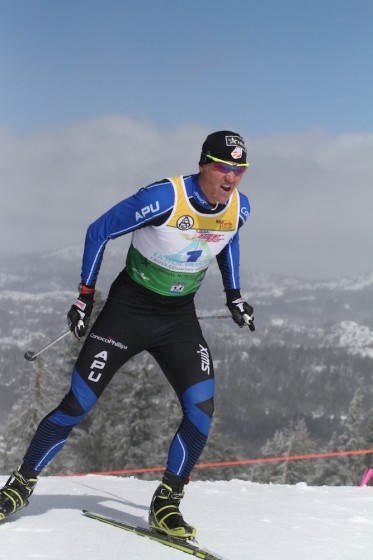
FasterSkier’s coverage of SuperTour Finals and U.S. Distance Nationals is brought to you by the generous support of Concept2, the leading manufacturer of indoor rowers, racing oars, and the SkiErg.
TRUCKEE, Calif. – Erik Bjornsen thought he was done for. The 21-year-old U.S. Ski Team and Alaska Pacific University (APU) skier had gone out too hard, too early in Monday’s 6-kilometer freestyle hill climb before the real ascent up Sugar Bowl Resort even started.
Bjornsen had been fighting nerves 24 hours before the final pursuit; thoughts about whether he could hold onto the overall lead for his first SuperTour Finals title infiltrated his mind.
Two U.S. Ski Team (USST) A-team members started closest to him: first Andy Newell (Stratton Mountain School T2 Team), 41 seconds back, then Kris Freeman (Maine Winter Sports Center), seven seconds later.
Bjornsen was excited, but anxious. Standing next to Newell on the start line, he smiled as the veteran jokingly talked trash.
“I was telling him I was gonna catch him, even though I really knew I probably wasn’t,” Newell said after the race.
Bjornsen laughed, most concerned about Freeman. Starting less than a minute ahead of the defending SuperTour Finals champ wasn’t necessarily enough. But around four kilometers in, Bjornsen was already more than 15 seconds up on him.
Normally, that would be great for Bjornsen, but not when you’re climbing more than 1,000 feet to the top of Mt. Disney, nearly 8,000 feet above sea level.
Upon hearing the split from APU head coach Erik Flora, Bjornsen felt a pang of panic. He wasn’t comfortable; he was dying, he said.
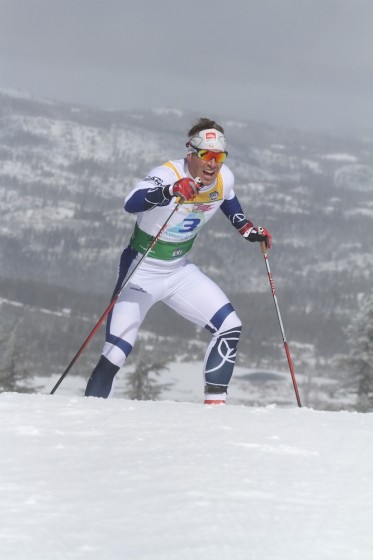
About a kilometer later, Bjornsen looked back to face reality. Freeman was right behind him. Moments later, he caught Bjornsen. The two skied together for the remainder of the grueling climb, turning the corner at the ridgeline into a massive wind.
Now’s my chance, Bjornsen thought. He found his own second wind and pushed the pace.
“I was starting to put some time on him,” Bjornsen recalled. “When I saw that first chairlift, I thought we were finishing right there, so I put a sprint on and I got up over that first hump.”
But the finish line wasn’t there. Bjornsen’s stomach sank again, but he quickly lifted his head up, guessing he was about 10 feet ahead of Freeman.
“I was like, ‘I’ve put this effort in and I can’t let it go now,’ ” he said. “Then one of my coaches was like, ‘It’s right there!’ I tried to put in another kick and got up over that little hill and just kind of walked over the finish line. I think it was the hardest I’ve ever pushed myself.”
The runner-up by 20.5 seconds, Freeman, 32, said he gave it his all as well. Along the gradual uphill to the finish, he also tried to attack.
“I thought by turning the screw by one click at the top I’d be able to go by him, but he turned up three clicks and he beat me,” Freeman said. “I don’t really feel like I lost today; I feel like he won.”
That’s a unique statement coming from the three-time Olympian.
“I hate losing,” Freeman said. “But it’s exciting going into next year at the Olympics. If we have Bjornsen there skiing like this, we’re starting get a real relay team going and that’s pretty cool.”
For Bjornsen, the SuperTour Finals crown – a culmination of four days of racing in the last week – was another stellar result in a season filled with breakthroughs. Last year, Bjornsen was third in the tour; this year, he was the top domestic racer as the period-one SuperTour leader. A USST development skier for the last two seasons, he went on to achieve his first national title in the 15 k freestyle and also made the World Championships team.
According to Flora, Bjornsen’s gold-medal winning performances at SuperTour Finals, with a prologue victory and two other podiums, weren’t unexpected, but they sure were nice.
“I think the biggest thing is it’s just confirming,” Flora said. “Last summer we made a pretty big push in his training, and there’s always the chance that it goes great and there’s the chance that it doesn’t go as well.
“You always have goals and think you can reach a certain level, but to see how strong he was during this tour, I think it surprised both of us,” he continued. “The confidence he brings into next year will be the biggest addition to his performance.”
With the fourth-fastest time of the day, Bjornsen completed the course – downhill and gradual for the first four kilometers, and up for the last two – in 25 minutes, 28 seconds. It wasn’t the 13-minute, 1.8 k hill climb he had taken third in last year at Jay Peak in Vt., and just like that one, it wasn’t easy.
“I can’t believe I won the overall tour,” Bjornsen said. “I did not expect that at all coming into this week, and I’m super excited with all the racing that’s gone on so far.”
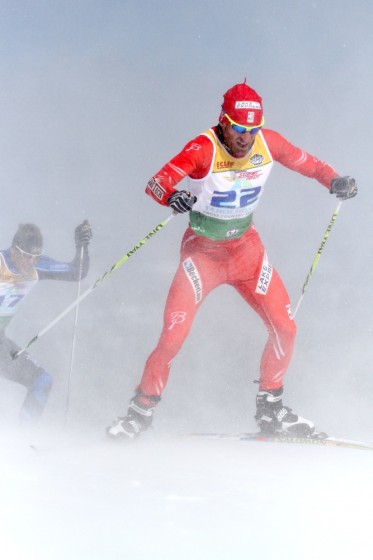
Freeman was the fastest from the bottom in 25:00.5, about 15 seconds ahead of 10th-place finisher Brian Gregg (Central Cross Country), who had the second-fastest time for the second-straight year.*
USST member Tad Elliott (Ski & Snowboard Club Vail/Team HomeGrown) ranked third for time, 20.6 seconds behind Freeman. He was 13th overall. **
Despite establishing himself as one of the nation’s fiercest hill climbers, Freeman isn’t a fan.
“It was absolutely miserable,” he said. “I don’t think anyone here actually wanted to do the race today.”
Several inches of new snow covered the alpine slopes, making the freestyle race even more work than expected. Early Monday morning, winds gusted at near 40 miles per hour at the bottom, reaching above 50 mph near the top.
“I kind of hope that this is the hill climb that ends hill climbs at Spring Series,” Freeman said. “I don’t think it’s something that we necessarily need to practice. It only happens once on the World Cup a year.”
He suggested a 15 k skate pursuit to complement the 15 k classic mass start, or have a 50 k mass start and a 30 k pursuit.
“I don’t think that doing a mini tour every year is necessary,” Freeman added. “I think that this hill climb and Jay Peak was a bit over the top.”
Racers were divided over which was tougher, with Jay Peak launching into a relentless incline without a lower loop. Overall third-place finisher, Mikey Sinnott (Sun Valley Ski Education Foundation), said it depended on the day.
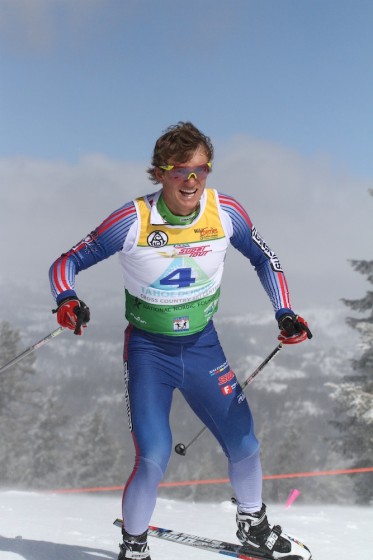
“It’s so easy to tip over and just have a rough day out there, and that just changes your perspective of it,” said Sinnott, who started fourth, 52 seconds behind Bjornsen. He finished 1:07.9 back with the seventh-fastest time.
“Sometimes they can go well, sometimes they can go bad,” he said. “Hill climbs are the worst race when you have 3 k to go and you can’t see straight.”
Lucky for him, he felt “solid,” he said.
“I wanted to try to stick with Freeman a little more, but he got a little bit of separation on me on the first little hill,” Sinnott said of the first 3 k. “Newell got between us so that kind of let Freeman go, but it worked out because that kept me under control.”
Sylvan Ellefson (SSCV/HomeGrown) started 1:16 back in sixth and caught Sinnott early in the two-kilometer climb. Ellefson stuck behind him until the top, and the two worked together to try to catch Freeman.
“When you’re on a slope so steep, it looks like you’re really close, but really you’re like 40 seconds behind,” Ellefson recalled. “We moved up on him a little bit, then Mikey jumped in front of me again and after that we skied together towards the top.”
Battling for third, Ellefson passed him again as they turned the corner along the ridge. For Sinnott, the timing couldn’t have been better.
“Sylvan passed me right when the headwind started coming,” Sinnott said. “He took the brunt force of that and gave me a little bit of a cushion.”
Before the finish, Sinnott overtook Ellefson once more.
“I was having a lot of trouble with my legs so I did what I could to hold on and hold onto the time that I had,” Ellefson said. He finished 20.1 seconds behind Sinnott in fourth with the fifth-fastest time.
“I’m not usually a climber, but I think at this altitude I can be,” the Vail native said.
Newell finished fifth overall (+1:42.6) after placing 35th in the opening prologue and clawing back into contention with a classic-sprint victory on Saturday.
“The hill climb’s a tough event for me,” Newell said after entering the pursuit in second. “I think it could’ve been a lot better tour if I would’ve had a better prologue.”
Skiing with Freeman early, Newell said he fell behind on the first part of the climb, letting both him and Sinnott go by him.
“I just felt like they were going a little bit too fast so I skied up the mountain myself,” he said. “I couldn’t really find the motivation. It was super hard today so I went kind of easy.”
Freeman was also disappointed with two of his three previous SuperTour Finals results: he was 11th in the prologue and 38th in the sprint, failing to qualify for the heats and losing the overall lead (after he won Friday’s 15 k classic mass start).
“I’m disappointed that I lost the tour, but it’s hard to overcome two really crappy days,” Freeman said. “I feel good about winning both distance days on the time.”
Also:
* Gregg found success on his wife’s skis, using Caitlin Compton Gregg’s 182-centimeter Salomons for the first time in a race.
“A little bit shorter, a little lighter,” he said. “It’s an advantage of being a married couple; you share your fleets a little bit.”
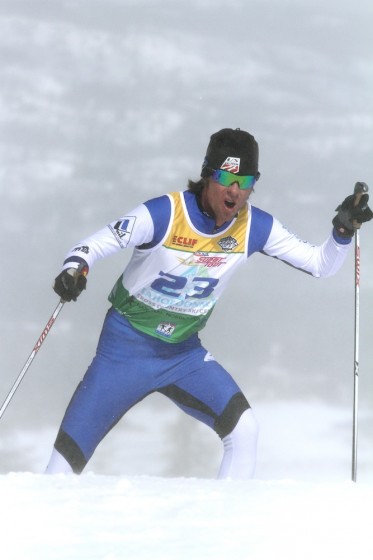
Gregg started 22nd and ended up 10th, catching a ride from Elliott, who started 23rd and made up 10 seconds on him within the first 4 k. The two skied together up the climb, picking off places along the way.
“It’s a disadvantage to start three minutes back, but it’s also an advantage because you can catch people,” Gregg said. “It’s sort of like having real-time splits. I couldn’t see Erik or Kris, those guys were way up there, but I could see some of those other guys.”
** “I actually caught and passed Brian Gregg before the steep part and gained time back into him,” Elliott said. “He caught me on the steeper sections and we skied together ’til the finish.”
According to Elliott, who ended up 13th behind Gregg, Mark Iverson (APU) in 11th, and Trygve Market (University of Denver) in 12th, it wasn’t much of a final sprint.
“I could see the finish line, but just couldn’t do anything at that point,” he said. “I was pretty tired. I really wanted to try to go for time of day, that was a goal … but the steep sections are actually kind of a weakness for me. Brian was skiing those the best, I think, of the field.”
— Audrey Mangan contributed reporting
Results: Overall | Time-of-day
Alex Kochon
Alex Kochon (alexkochon@gmail.com) is a former FasterSkier editor and roving reporter who never really lost touch with the nordic scene. A freelance writer, editor, and outdoor-loving mom of two, she lives in northeastern New York and enjoys adventuring in the Adirondacks. She shares her passion for sports and recreation as the co-founder of "Ride On! Mountain Bike Trail Guide" and a sales and content contributor at Curated.com. When she's not skiing or chasing her kids around, Alex assists authors as a production and marketing coordinator for iPub Global Connection.

